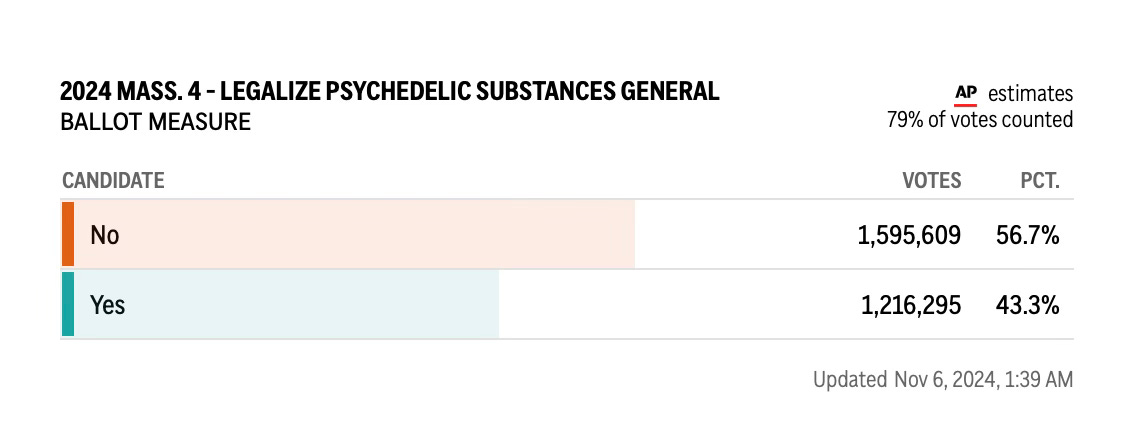Massachusetts Psychedelic Ballot Question 4 Fails to Legalize Psilocybin Therapy
The 2024 ballot initiative aimed to legalize supervised psilocybin use and decriminalize home cultivation, possession, and sharing of mushrooms, iboga, ayahuasca, and mescaline
The campaign to legalize supervised psychedelic use in Massachusetts has failed. Though only 79% of the votes had been counted by 1:39 AM this morning, the votes against Question 4 outnumbered those in favor by nearly 400,000.
When results started rolling in last night at around 9 PM, the votes in favor and against the initiative were nearly even. But the “no” votes accumulated quickly to surpass those in favor, and the gap widened throughout the evening and early morning hours. Opponents declared victory at around 1:00 AM.
The campaign to pass Question 4 launched on July 3, 2023 as Massachusetts for Mental Health Options. It was funded and overseen by the Washington, DC-based New Approach PAC. The PAC had funded successful psychedelic ballot initiatives, including Oregon’s Measure 109 in 2020 and Colorado’s Proposition 122 in 2022.
New Approach previously ran succesful campaigns to legalize marijuana in many U.S. states, including Massachusetts. In 2016, the state legalized adult marijuana use through a ballot initiative that was also named Question 4.
If Question 4 had passed this morning, it would have decriminalized plants and fungi containing five psychedelic substances in December, including psilocybin, psilocin, ibogaine, DMT, and mescaline. Criminal penalties would have been eliminated for their limited cultivation, possession, and sharing.
Question 4 would also have created a state psychedelic agency modeled after the Massachusetts Cannabis Control Commission. The agency would have drafted rules for the resulting psychedelic industry, which would open in 2026. A state psychedelic advisory board would have been formed to make regulatory recommendations to the new agency.
Proponents of Question 4 claimed psychedelics could help address the state’s mental health crisis. However, the ballot initiative was controversial. In March, state lawmakers formed a rare Special Joint Committee on Initiative Petitions. New Approach and its campaign organized a series of panels to inform the Committee. Speakers included doctors, patients, parents, political strategists, and politicians. In its formal report, the Committee raised concerns regarding Question 4 and declined to recommend it to the legislature, which reserves the right to enact ballot initiatives before they reach voters.
In October, the editorial board of the Boston Globe failed to endorse Question 4, citing safety concerns. The Tufts University Center for State Policy (cSPA) published a report on legalizing psychedelic drugs. Among the possible benefits, cSPA found that psilocybin showed promise for treating some mental health conditions. However, it noted that psychedelics also carry risks. “For instance, ibogaine can cause acute cardiac problems.” cSPA concluded that state-regulated psychedelic treatments “would likely be expensive,” and because psychedelic remain federally illegal, “Question 4 could put Massachusetts at risk of a future federal backlash.”
It’s unclear what led voters to reject Question 4. In Massachusetts, New Approach faced greater opposition than it had in other states. Recent scandals plaguing the Massachusetts Cannabis Control Commission might have contributed to voters’ hesitation.
Nevertheless, the Yes On 4 campaign gained an impressive list of supporters, including actress Eliza Dushku, U.S. Senator Elizabeth Warren, and many doctors, veterans, and researchers from across the country. The campaign produced polished television advertisements and held press conferences outside the State House.
New Approach reportedly chose Massachusetts as the site of its psychedelic campaign due to polling. “After some initial exploration — considering the timeline and our capacity to take this on — we looked at the bigger picture and it became clear that Massachusetts would be a pretty great place to launch a campaign,” said New Approach Policy Director Jared Moffat last year.
Massachusetts was already home to significant grassroots activism. It led the nation for local psychedelic decriminalization. Today, eight Massachusetts cities have decriminalized psychedelics by making them their lowest law enforcement priority.
It is unclear what Question 4’s failure means for the future of psychedelic policy in the state. Due to limitations of the state constitution, no substantially similar ballot initiatives can be filed for two years. It also remains uncertain how this outcome will impact psychedelic policy in other states.
In Massachusetts, lawmakers might pick up the issue, or local psychedelic decriminalization could continue to expand.
*The views expressed on Psychedelic Week do not represent the views of Harvard University, POPLAR at the Petrie-Flom Center at Harvard Law School, Florida State University, or the Florida State University College of Law. Psychedelic Week is an independent project unaffiliated with these and other programs and institutions.
Mason Marks, MD, JD is a visiting professor of law at Harvard Law School. He is also the Florida Bar Health Law Section Professor at Florida State University, senior fellow and project lead of the Project on Psychedelics Law and Regulation (POPLAR) at the Petrie-Flom Center at Harvard Law School, and an visiting fellow at the Information Society Project at Yale Law School. Marks teaches drug law, psychedelic law, constitutional law, and administrative law. Before moving to Florida, he served on the Oregon Psilocybin Advisory Board where he chaired its Licensing Subcommittee. Marks has drafted drug policies for state and local lawmakers. His forthcoming book on psychedelic law and politics will be published by Yale University Press. He tweets at @MasonMarksMD and @PsychedelicWeek.



